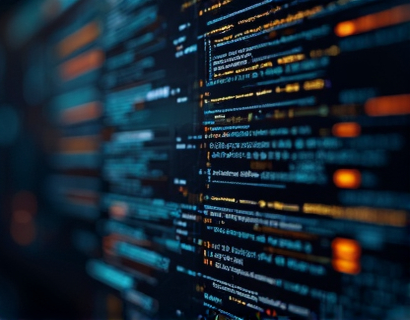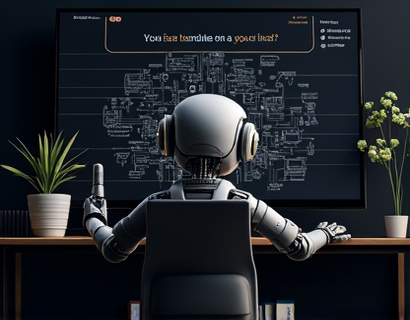The Synergy of AI and Crypto: Pioneering Financial Innovation
The intersection of artificial intelligence and cryptocurrency is igniting a revolution in digital finance, promising a future that is more efficient, secure, and personalized. This fusion of technologies is not just an evolution but a transformation of how we perceive and interact with financial systems. As we delve into this topic, it's essential to understand the foundational roles that AI and crypto play individually before exploring their combined potential.
Understanding Artificial Intelligence in Finance
Artificial intelligence, or AI, refers to the simulation of human intelligence processes by machines, particularly computer systems. These processes include learning, reasoning, and self-correction. In the context of finance, AI is leveraged to analyze vast amounts of data, identify patterns, and make predictions with a level of speed and accuracy unattainable by human analysts. Machine learning, a subset of AI, is particularly influential, enabling systems to improve their performance over time without being explicitly programmed.
The application of AI in financial services is vast and varied. From algorithmic trading, where AI algorithms execute trades based on predefined criteria, to fraud detection, where machine learning models identify unusual patterns that may indicate fraudulent activity, AI is reshaping the financial landscape. AI-driven chatbots and virtual assistants are enhancing customer service by providing 24/7 support and personalized financial advice. Moreover, AI is instrumental in risk management, helping institutions assess and mitigate risks more effectively.
The Rise of Cryptocurrency
Cryptocurrency, on the other hand, is a digital or virtual currency that uses cryptography for security. The most well-known cryptocurrency is Bitcoin, but there are thousands of others, each with unique features and purposes. Cryptocurrencies operate on decentralized networks, typically blockchain, which ensures transparency, security, and immutability of transactions. This decentralized nature eliminates the need for intermediaries like banks, reducing transaction costs and increasing accessibility.
The creation of cryptocurrencies is facilitated by blockchain technology, a distributed ledger that records transactions across multiple computers. Each block in the chain contains a cryptographic hash of the previous block, a timestamp, and transaction data. This structure makes the blockchain highly secure and resistant to tampering. The decentralized and transparent nature of cryptocurrencies has attracted significant attention and investment, driving innovation in the financial sector.
AI and Crypto: A Match Made in Tech Heaven
The combination of AI and cryptocurrency is creating a new paradigm in digital finance. AI enhances the functionality and security of cryptocurrencies, while cryptocurrencies provide a robust and innovative platform for AI applications. Let's explore some of the key areas where AI and crypto intersect and drive financial innovation.
Smart Contracts and AI
Smart contracts are self-executing contracts with the terms of the agreement directly written into code. They run on blockchain networks and automatically execute when predefined conditions are met. AI can significantly enhance smart contracts by adding layers of intelligence and adaptability. For instance, AI can analyze market conditions and dynamically adjust the parameters of a smart contract to optimize outcomes. This fusion can lead to more efficient and reliable contract execution, reducing the need for manual intervention and minimizing errors.
Enhanced Security Through AI
Security is a paramount concern in the crypto space, and AI plays a crucial role in bolstering it. AI-powered systems can monitor blockchain networks in real-time, detecting and responding to potential threats such as hacking attempts or fraudulent activities. Machine learning algorithms can identify unusual patterns and anomalies that may indicate malicious behavior, allowing for proactive measures to be taken. Additionally, AI can improve the security of private keys and wallet management, reducing the risk of unauthorized access.
Personalized Financial Services
One of the most exciting aspects of AI in finance is its ability to provide personalized services. AI algorithms can analyze a user's financial data, behavior, and preferences to offer tailored recommendations and insights. In the context of cryptocurrencies, AI can help users make informed decisions about investments, trading, and asset management. For example, AI-driven platforms can analyze market trends, provide predictive analytics, and suggest optimal times for buying or selling cryptocurrencies based on a user's risk profile and financial goals.
Automated Trading and Robo-Advisors
AI-driven automated trading systems, often referred to as robo-advisors, are revolutionizing the way people invest in cryptocurrencies. These systems use AI to analyze market data, identify trends, and execute trades without human intervention. Robo-advisors can manage portfolios, diversify investments, and adjust strategies based on real-time market conditions. This not only democratizes access to sophisticated investment strategies but also reduces the emotional biases that can lead to poor decision-making.
Fraud Detection and Compliance
Fraud and regulatory compliance are significant challenges in the crypto industry. AI can help address these issues by implementing advanced fraud detection systems. Machine learning models can analyze transaction patterns and user behavior to identify suspicious activities with high accuracy. This proactive approach to fraud detection can protect both users and platforms from financial losses and reputational damage. Additionally, AI can assist in navigating the complex regulatory landscape by ensuring compliance with various laws and regulations, thereby reducing legal risks.
Decentralized Finance (DeFi) and AI
Decentralized Finance, or DeFi, is an emerging sector that leverages blockchain technology to create financial services without traditional intermediaries. AI is playing a pivotal role in the development and optimization of DeFi protocols. For instance, AI can enhance lending and borrowing platforms by assessing creditworthiness more accurately and dynamically adjusting interest rates based on market conditions. AI-driven risk management tools can also help DeFi platforms mitigate risks and ensure the stability of their operations.
User Experience and Interface Improvements
The user experience in the crypto space can be complex and intimidating for newcomers. AI can simplify this by creating more intuitive and user-friendly interfaces. Natural Language Processing (NLP) technologies, a subset of AI, can power chatbots and virtual assistants that guide users through transactions, provide explanations, and answer queries in a conversational manner. This not only enhances user engagement but also lowers the barrier to entry for those new to cryptocurrencies.
Predictive Analytics and Market Insights
Predictive analytics powered by AI can provide valuable insights into market trends and behaviors. By analyzing historical data and real-time market conditions, AI models can forecast price movements, identify potential investment opportunities, and highlight risks. This can be particularly beneficial for both individual investors and institutional players looking to make data-driven decisions. AI-driven analytics tools can also help in understanding the sentiment of the market, providing a more comprehensive view of the financial landscape.
Challenges and Considerations
While the integration of AI and crypto offers numerous benefits, it also presents several challenges that need to be addressed. One of the primary concerns is the regulatory environment. The decentralized and borderless nature of cryptocurrencies complicates regulatory oversight, and the use of AI adds another layer of complexity. Ensuring compliance with varying regulations across different jurisdictions is crucial to avoid legal issues and maintain trust in the system.
Another challenge is the ethical use of AI. The deployment of AI in finance must be guided by ethical principles to prevent biases and ensure fairness. Transparency in AI algorithms and decision-making processes is essential to build trust among users. Additionally, the security of AI systems themselves must be robust to prevent vulnerabilities that could be exploited by malicious actors.
Future Prospects
The future of AI and crypto is bright, with numerous potential developments on the horizon. As AI technologies continue to advance, we can expect even more sophisticated applications in the financial sector. For instance, the integration of AI with quantum computing could lead to breakthroughs in cryptography, enhancing the security of blockchain networks. The development of more advanced NLP models could further improve user interactions with crypto platforms, making them more accessible and user-friendly.
Moreover, the convergence of AI and crypto is likely to drive innovation in other areas such as supply chain finance, insurance, and real estate. The principles learned from the crypto-AI synergy can be applied to create more efficient and transparent financial systems across various industries. As more institutions recognize the potential of this fusion, we can anticipate a surge in research, development, and adoption.
Conclusion
The fusion of AI and cryptocurrency is not just a technological trend but a transformative force reshaping the financial industry. By leveraging the strengths of both technologies, we are witnessing the emergence of a more efficient, secure, and personalized financial ecosystem. As we move forward, it is crucial to address the challenges and ensure that the benefits of this synergy are realized responsibly and ethically. For tech and finance innovators, the future is promising, and the possibilities are endless.










































